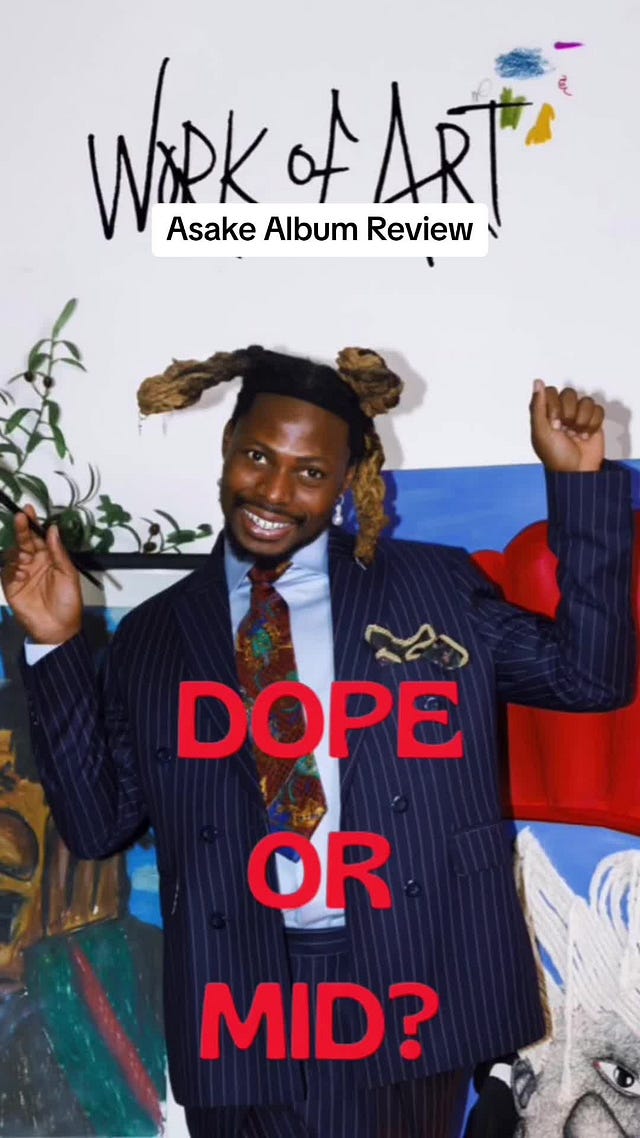Asake's 'Work of Art' Review - When you see the same painting twice
Asake delivers his sophomore album using the same formula producing solid results.
Asake's sophomore effort, ‘Work of Art’, is the portrait of a man aware of God's favour in his life and his impact in Afrobeats in the last 18 months.
In his second go-round, Ahmed Olalade starts with a stirring testimony, praising the ruler of the Heavens for orchestrating his nimble rise to the top of the charts. The Dramatic Arts graduate from the illustrious Obafemi Awolowo University strips his ego, bows and rolls in obeisance to God in ‘Olorun.’
In life's Amphitheatre, Asake stands and testifies, “Many, many things I no fit shalaye/ 2022 Mo gbe won trabaye o/ Oluwa lo gbe from the slum to the top” on the second song ‘Awodi’ as he continues his thanksgiving.
Asake goes on the pulpit to motivate his congregation of street hustlers that victory will surely come if they never stop to grind on ‘Sunshine.’ He samples Lighthouse Family's ‘Ocean Drive’ to deliver the most refreshing moment on his album.
After this sermon of gratitude and life lesson, interrupted by the album's lead single ‘2:30’, Asake's ego returns.
On ‘Basquiat’, he says he is the incarcerated narco-kingpin, Joaquín Archivaldo Guzmán Loera (aka El Chapo), legendary Juju titan Chief Commander Ebenezer Obey, and gives himself the title of “capo di tutti i capi”, a term used for crime bosses in the Sicilian or Italian-American mafia.
This neo-expressionist painting of this neo-Fuji act is a triptych (a picture or relief carving on three panels) made by patent strokes of Amapiano's schizophrenic log drums, Fuji cadences and rap rhyme structures. It's a style that has been celebrated and imitated much to the irritation of Asake.
On ‘Basquiat’, he mocks the copycats by saying it is an honour for them to study him. Throughout the album, he throws sly digs at them.
He proudly proclaims ownership of the game on ‘I Believe’, where he calls himself the “landlord.” He flexes his lyrical chops with this set of numerical-inspired bars, “Dey want make my value go down like metaverse/Make I hammer dem second verse/Ọlọgbọn loni universe.”
Meta is the Yoruba word for three and in that line, Asake highlights the fading presence of third verses in modern-day pop songs. Uni is Latin for one.
On the preceding song, ‘What's Up My G’, his bouncy, greasy, frictionless flow over Magicsticks' concoction of a pulsating drumline, reverberating log drums intermittently accompanied with a saxophone, light up the party.
While Asake parties and toasts a buxom baddie, he still drops life lessons on ‘Introduction.’ He says there is enough space for everyone to flourish, and the reward for hard work is profit.
“Wetin you love o/No be wetin I love o/Wetin I love I go do am with all my heart o” he sings on the reflective ‘Lonely at the Top.’
Asake does what works best for him, and on this album, it's sticking to the same script that made his debut album an enormous success.
His neo-Fuji delivery style, the Amapiano production style tweaked and intensified to mirror the hyperactivity of Lagos- the global capital of Afrobeats- and the group chants are all on this album.
Some might baulk at the lack of a change in formula, but this time the boisterous energy is toned down a bit on ‘Work of Art.’ The crowd vocals don't sound as voluminous. Levelling the production style helps ensure a tighter project that allows deep cuts to shine and not be gulped by monster singles like ‘PBUY’ and ‘Terminator.’
A song that shines the brightest but does not steal the show is ‘Remember’ produced by Magicsticks. Asake switches flow almost every four bars till he sails into a sweet melody at the end of the hook. The sax- an instrument incorporated by Fuji legend K1 D Ultimate during his progressive era- is a delightful addition to this song.
The song highlights the chemistry between the singer and producer, who are gunning for the best act/producer duo in Afrobeats.
There is a tendency to categorize Asake's sophomore album as one big lump of the same production elements.
Due to the high exposure to his music in the last 18 months, some listeners may have developed an auditory resistance to his music, thereby creating a delayed high.
After a few good spins, it kicks in and you begin to appreciate the music.
Asake has another strong album in his discography using the same elements that enabled him to hijack the Afrobeats scene. His preference for Yoruba proverbs, and colourful and street-wise quips still paint the picture of a street hustler who has hit the jackpot.
How long can he go using the same script? No one knows, but let's gaze at his beautiful painting now.










Great review
Omo AOT you finish work 🙌🏾